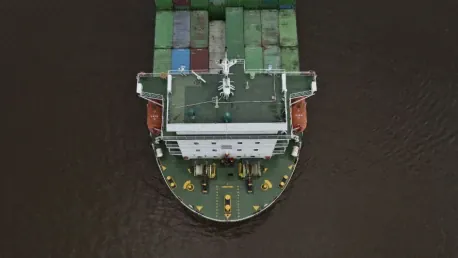In a bold move towards reducing the environmental impact of its global logistics, luxury vehicle manufacturer JLR has joined European sustainable RoRo carrier UECC’s “Sail for Change” initiative. This ambitious program aims to decarbonize maritime transport through the use of low-carbon liquefied biomethane (LBM). JLR’s participation underscores the growing commitment of car manufacturers to sustainability as the cumulative number of manufacturers involved in the initiative rises to four. By sourcing its bioLNG from Titan Clean Fuels, UECC supplies its fleet of five dual-fuel LNG Pure Car and Truck Carriers operating in the European short-sea trade. Initially launched as Green Gas Month in July 2024, the program has been extended into 2025, backed by a supply deal with Titan Clean Fuels, ensuring the provision of LBM at the Port of Zeebrugge for most of the year. This extension alone is anticipated to cut over 75,000 tons of greenhouse gas emissions.
JLR’s Commitment to Sustainability
Daniel Gent, UECC’s Energy & Sustainability Manager, highlighted the importance of JLR’s participation in the “Sail for Change” program, noting that it demonstrates the company’s dedication to developing sustainable maritime transport solutions. JLR has set forward-looking goals, planning to deliver electric models of all its luxury vehicles by 2030 and aiming for net-zero emissions across its entire value chain by 2039. These targets will be achieved through a series of initiatives, including the decarbonization of its manufacturing and supply chains. The inclusion of JLR in the program not only strengthens the initiative but also sets a precedent for other car manufacturers to follow suit in their own sustainability endeavors.
Addressing Regulatory Pressures and Exploring Alternative Fuels
Interest in the “Sail for Change” initiative has surged due to increasing regulatory pressures on car manufacturers like JLR to prioritize decarbonization. Reducing emissions through collaboration with supply chain partners has become crucial. UECC is already making strides by utilizing alternative bunker fuels such as LBM and biodiesel in its 15-vessel fleet, substantially reducing its carbon footprint. Additionally, UECC is actively investigating zero-carbon fuels like hydrogen and ammonia to further its sustainability goals. Their partnership with Titan Clean Fuels enhances UECC’s dedication to alternative fuels and ensures carbon-neutral loading operations at ports. Clients also benefit from receiving verified emissions data, promoting transparency and accountability.
In summary, JLR’s involvement in UECC’s “Sail for Change” initiative marks a significant move in the maritime industry’s shift towards sustainability. This collaboration mirrors the trend among major vehicle manufacturers to minimize their carbon footprint and meet regulatory requirements. The initiative underscores the increasing responsibility within logistics and transportation sectors to adopt eco-friendly practices. Through such partnerships, substantial progress towards a sustainable future is achievable.









